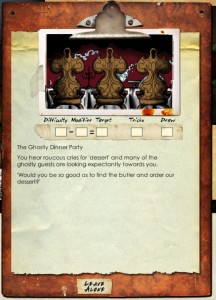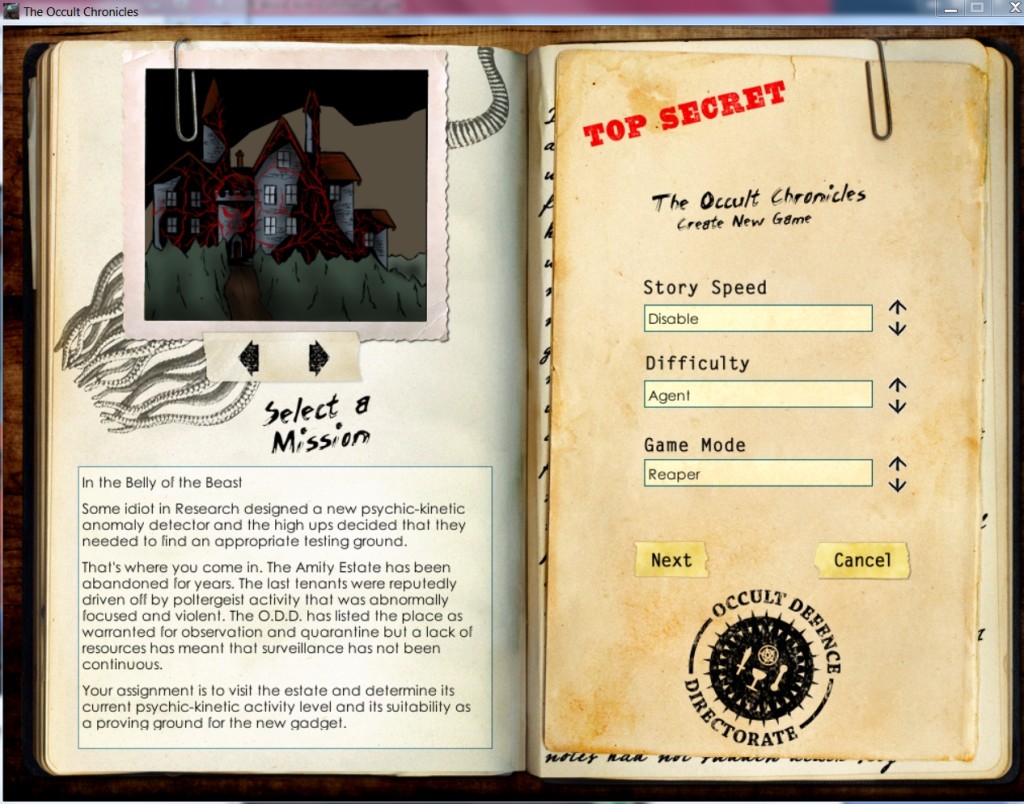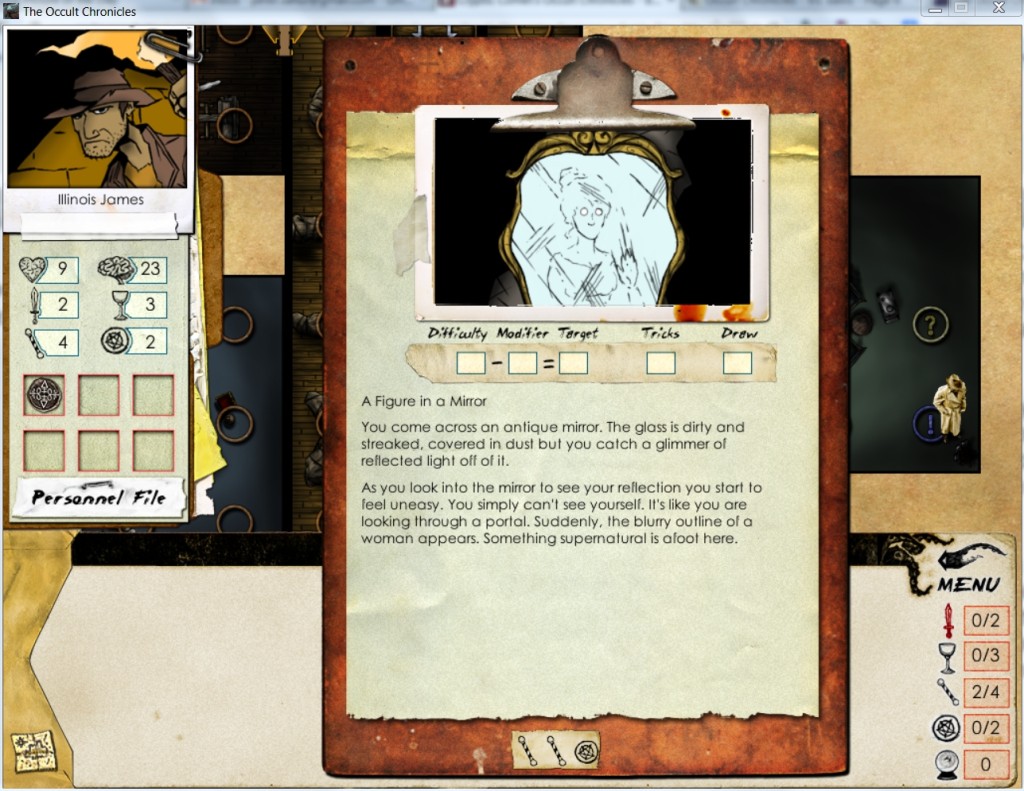I am very pleased to publish an email interview with Vic Davis, the indie game designer behind Armageddon Empires (one of my favourite strategy games), Solium Infernum, and Six-Gun Saga. Read on for our conversation about Vic’s latest title, roguelike/board game hybrid Occult Chronicles, in which we discuss his inspirations, his lessons learned, the challenges of indie development, and more.
Peter Sahui: Hello Vic – welcome to the site! Occult Chronicles is your fourth game, after Armageddon Empires, Solium Infernum, and Six-Gun Saga. What lessons from your previous games came in handy for this project?
Vic Davis: Well from a technical standpoint I have over a decade of experience with the development environment that I use (Adobe Director). I’ve also got a huge library of code for doing everything from creating drop down menus to path finding for any AI. On the design side it has helped a lot to have shipped previous games. Even though attempting a rogue like is a new direction for me, I was able to draw upon the experience that I had gained while designing turn based strategy games. In the end my new game is really just an adventure strategy game so it shares a lot of the same elements.
Peter: Compared to Armageddon Empires, random chance seems to play a much bigger role in Occult Chronicles. What made you emphasise luck, and how did you balance it?
Vic: Yeah, without any of the map or positional elements that most TBS games offer, the conflict resolution elements really pop out to the fore. And Occult Chronicles has a lot of rpg baggage so you have this paradigm of stats/abilities being used to influence some probabilistic outcome matrix. Calling it luck though is something of a misnomer in my opinion. Chance plays a big part but I tried to craft a system of mechanics where smart playing could nudge the scales in your direction. In the Occult Chronicles you need to weigh risk versus reward when you encounter various “challenges” in the game. You are usually given various options that key off of your attributes so it might be better to talk to an encounter rather than attack it. Similarly, sometimes it’s better to run away or postpone a choice. I do admit that the way I designed the results phase for the game where you basically pick random cards to determine your rewards or penalties for an encounter, does serve to really accentuate the idea that the game is really random. And I’m not sure random is really bad especially in a rogue like. It’s something that is demanded for the map generation and figures prominently in many other aspects like what you encounter on a level or whether you hit it. Coping with the random elements is really supposed to be part of the fun. But then so is dying a lot so go figure.
Peter: What feature in Occult Chronicles are you proudest of?
Vic: That’s really hard to say. There isn’t anything revolutionary in the game. I did try to be clever in the way the mechanics work i.e. the tarot card system for attributes and the way you can use item special abilities to modify the card game. I would have to say that I’m most proud of the overall thematic experience that it tries to convey. You get to explore a haunted house. It’s tough to find that experience nowadays. The horror genre is more about exploding zombie heads.
Peter: Were there any features you wanted to include, but couldn’t?
Vic: There was just a lot of content actually; things like side quests to separate playing areas or pocket dimensions. There were mechanics that I had dabbled with and some like the dice rolling system ended up getting pared down because it was just an extra complication.
Peter: One of my favourite things about Occult Chronicles is its whimsical atmosphere and art style – it’s a refreshing change from similarly themed games (such as Elder Sign: Omens), which often take themselves very seriously. What influenced this decision?
Vic: I ended up doing all the writing on this project because it was really delayed and when I finally started doing the data entry for everything I was ending up spending as much time describing what I wanted written as it would have taken to just write it. So, I dove in and tried to be witty and dry. And I tried really hard not to be goofy. I worked with David North who did all the illustrations for the game encounters so that it would have a comic book style that reminded people of B.P.R.D and Hellboy. I’m a big fan of those works so I tried to riff off of those and not take everything stone cold serious. I had a lot of fun working in pop culture/horror references without going overboard.
 Peter: Speaking about your projects in general, what are some of your non-gaming inspirations? I can guess Western movies for Six-Gun Saga, but what gave you the ideas for the respective settings of Armageddon Empires and Solium Infernum?
Peter: Speaking about your projects in general, what are some of your non-gaming inspirations? I can guess Western movies for Six-Gun Saga, but what gave you the ideas for the respective settings of Armageddon Empires and Solium Infernum?
Vic: Armageddon Empires was just an idea that popped into my head when I was looking for a theme for a TBS game. Of course, I was a big fan of Wasteland, Fallout, Terminator etc. and those all influenced the little world that I crafted. Solium Infernum was hatched from a few lines in Milton’s “Paradise Lost”: “To reign is worth ambition though in hell. Better to reign in hell than serve in Heaven.”
I like to read Sci-fi and Fantasy these days. It used to be that I never read any fiction but that’s basically all I read now. My favourite authors are Jack Vance and Glen Cook. I’ve recently been reading all the Erikson and Esslemont books and have really enjoyed those.
Peter: The games industry has changed a lot and, I think, become far indie-friendlier since you began with Armageddon Empires. How have these changes affected you?
Vic: Well yes and no as far as friendly goes. Things like digital distribution and the idea of buying a game from a small “indie” company are now common proven concepts. Retail is dead and that means that guys like me can try to make a living selling direct to customers. It’s a hardscrabble living but you can eke one out. But the deflation of prices because of the new disposable mobile games culture, free to play, micro transactions etc. has meant that I need to sell more units at a lower price and that’s not a sure thing for games that have niche customer base. I remember a few years ago talking to a portal distributer who when I told him my sales figures for Armageddon Empires thought that I might have tapped the vein out there already….and he was probably right. Retail may be dead but the same dynamic is coming back from the grave to haunt small time indies. The control of the distribution channels by gate keepers is back with a vengeance. You either get on them or you struggle to stay alive. And even if you manage to set up a little peasant hovel next to the castle, you still pray every night that your shipment of shoes or vegetables will be sold at the castle markets. I’d imagine you would stay up at night pondering the whims of the King and hoping that his ministers respond to your missives.
Peter: What other themes or gameplay mechanics would you be interested in tackling in the future?
Vic: At this point I’m not even planning on making any future games. I’m going to spend the next 6 months or so improving The Occult Chronicles and then assess where I’m at. If I do anything it will be more board game like. I might even try my hand at a physical board game but that’s an even more brutal market. I once made products that were printed in China and stored in a garage and I’m not sure I want to go back to that. I’ve got some ideas for another TBS but it all depends on how The Occult Chronicles sells.
Peter: Do you have any last message for our readers?
Vic: My pitch for Occult Chronicles is pretty simple. It’s a board game about exploring a haunted house that you can play by yourself. I’ll have a demo of the game up shortly on my website and you can purchase it there as well. If you would like to see it up on your favourite portal, let them know about it.
Peter: Thanks very much for your time!
If you liked the demo, Occult Chronicles is now available to purchase from Vic Davis’ website.
Discover more from Matchsticks for my Eyes
Subscribe to get the latest posts sent to your email.


That’s an awfully affable looking ghost lady in that mirror.
That’s exactly what I like about the art style — there’s this sense of fun permeating through it. I like uncovering new encounters and seeing their art. (Compare FTL, which combined brutally hard gameplay with very upbeat chiptune music.)